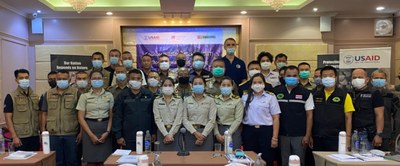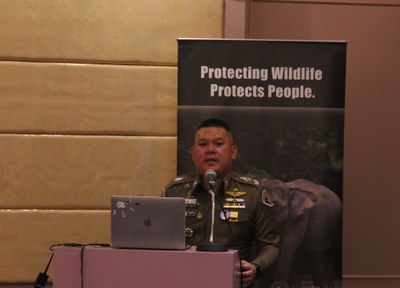USAID Trains Thai Border Officials to Dismantle Wildlife Criminal Networks
The training also emphasized increasing awareness of the dangers of zoonotic diseases associated with the illegal wildlife trade. The participants were sensitized to the “One Health” approach to tackle preventable illnesses at the animal-human-ecosystems interface.
The participants came from the Natural Resources and Environmental Crime Division of the Royal Thai Police (NED), Department of National Parks, Wildlife and Plant Conservation (DNP), Customs Department, Aranyaprathet Police Station, Khok Sung Police Station, Sub-Division 12 of the Border Patrol Police, and the Investigation Division of the Sa Kaeo Provincial Police.
Representatives from the United States Fish and Wildlife Service (USFWS) also attended the training as observers. The USFWS helped review CTOC training package materials and facilitate previous CTOC training courses.
“This training workshop provides an excellent opportunity to bring different law enforcement agencies together, build relationships, and enhance cooperation,” said Police Major General Pitak Uthaitham, the NED Commander of the Royal Thai Police, who has requested that approximately 500 NED police officers be trained in CTOC when the new online course becomes available.
 The CTOC model emphasizes the importance of collaboration, coordination, and information sharing among law enforcement agencies with the goal of dismantling international criminal networks. Over 400 law enforcement officers from various agencies in Southeast Asia and Africa such as customs, police, the judiciary, economic crime units, and wildlife protection authorities have been trained in CTOC with the support of USAID Wildlife Asia. They have since participated in the most widespread environmental crime operations ever organized that was led by INTERPOL and the World Customs Organizations, including Operations Thunderbird (2017), Thunderstorm (2018), Thunderball (2019), and Thunder (2020) which resulted in a combined total of over 15,300 animal seizures by the end of these operations and triggering 3,581 arrests and further investigations worldwide.
The CTOC model emphasizes the importance of collaboration, coordination, and information sharing among law enforcement agencies with the goal of dismantling international criminal networks. Over 400 law enforcement officers from various agencies in Southeast Asia and Africa such as customs, police, the judiciary, economic crime units, and wildlife protection authorities have been trained in CTOC with the support of USAID Wildlife Asia. They have since participated in the most widespread environmental crime operations ever organized that was led by INTERPOL and the World Customs Organizations, including Operations Thunderbird (2017), Thunderstorm (2018), Thunderball (2019), and Thunder (2020) which resulted in a combined total of over 15,300 animal seizures by the end of these operations and triggering 3,581 arrests and further investigations worldwide.
The illegal wildlife trade, estimated at $20 billion annually, threatens global economic development as well as biodiversity, affects vulnerable communities, and undermines national economies.


